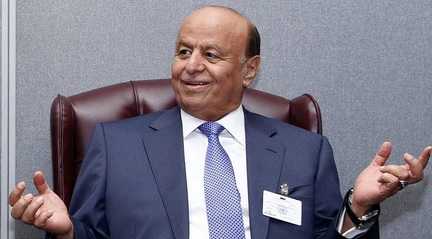
10 April 2022; MEMO: Yemeni President Abd-Rabbu Mansour Hadi has dismissed Vice President Ali Mohsen al-Ahmar and delegated his full powers to the newly formed eight-member Presidential Council to govern the country through a transitional period, Anadolu Agency reported.
Hadi has been based in Saudi Arabia since fleeing to the kingdom in February 2015 after the Iran-aligned Houthi rebels captured much of the country, including the capital Sanaa.
Head of the Presidential Council Rashad Al-Alimi said in his first speech broadcast on the state television that the council promises the Yemeni people to "work to end the war and establish peace," describing the group as a "peace council."
He also said the council is also a "defense, strength, and unity council, its mission is to defend the sovereignty of the country and protect the citizens."
Nasser Altawil, a lecturer at Sanaa University, doubted the council's goal as a "peace council" but described it as a "war council," because its structure represents the major military components inside the country.
Members include the council's head Rashad Al-Alimi, commander of the UAE-backed National Resistance Forces Tariq Mohammed Saleh, head of the United Arab Emirates (UAE)-backed Giants Brigades Abdulrahman Abu Zara'a, and head of the UAE-backed separatist Southern Transitional Council Aidarous Qassem Al-Zubaidi.
It also includes former Marib Governor Sultan Ali Al-Arada, Othman Hussein Megally — a lawmaker and a tribal leader in the main stronghold of the Houthis the southwestern Saada province of Yemen — Governor of the Hadhramaut province and commander of the Second Military Region Maj. Gene. Faraj Salmin Al-Bahsani, and Director of the Office of the Presidency Abdullah Bawazeer, who is also considered part of Hadi's inner circle.
Altawil told Anadolu Agency that the council's "best performance will be in the case of war against the Houthi rebels," because that is the "only thing that units the council's members."
But the council's head Al-Alimi set the main goals of the council to "restore the state and its institutions and achieve security and stability."
The Arab League, along with the US, France, and Turkey, expressed their support for the council and expressed optimism that it would lead the country to peace.




